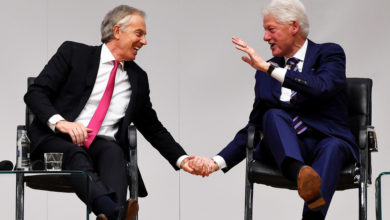Zawahiri Strike Exposes Taliban ‘VIP Treatment’ for Al-Qaeda

The killing of Ayman al-Zawahiri on a balcony in Afghanistan’s capital on Sunday morning demonstrated the deadly power and reach of U.S. intelligence services, even a full year after President Biden withdrew all U.S. forces from the country. Counterterrorism experts are concerned about one aspect: the exact location of the assassination.
The fact that Al Qaeda’s top leader was living with his family in an expensive neighborhood in downtown Kabul breaks into public view the degree to which the Taliban has given Al Qaeda’s leadership license to operate inside the country and, in some cases, even placing them in high-level positions in the government.
“We believe that there were senior members of the Haqqani Network who are affiliated with the Taliban who did know that al-Zawahiri was in Kabul,” Jake Sullivan, Biden’s national security advisor, said on NBC News on Tuesday. “There may have been other members of the Taliban that did not know.”
Zawahiri played a key role in planning the Sept. 11, 2001, attacks, as well as the 1998 bombings of U.S. embassies in Kenya and Tanzania, and took over Al Qaeda after Osama bin Laden’s death in 2011. Biden administration officials claim Zawahiri was in charge of terrorist organization up to his passing on Sunday.
Continue reading: Joe Biden Wants to Honor 9/11—By Moving On From National Security Priorities That Defined the Past 20 Years (2021)
Michael Allen, a former staff director of the House Intelligence Committee from 2011 to 2013 and a former senior official on President George W. Bush’s national security council, says the circumstances of the Zahawiri strike bring to mind the hard line that the Bush administration took on countries allowing terrorists within their borders in the wake of the 9/11 attack. “The Bush doctrine was, if you harbor a terrorist, we’re going to treat you as if you are a terrorist,” Allen says. “This isn’t just any garden-variety terrorist. This was an individual who was in on the plot for 9/11 and the embassy bombings as well.”
The Zahiwiri strike parallels in some ways Bin Laden’s assassination 11 years ago in a nighttime raid by U.S. special operations forces. The founder of Al Qaeda was living in a walled compound in northeastern Pakistan less than a mile from Pakistan’s top military academy. Bin Laden had been hiding there for six years, raising questions about whether Pakistan’s intelligence services knew he was there and turned a blind eye. In 2013, Al Jazeera reported on a classified report from a commission set up by the Pakistani government to investigate the circumstances of bin Laden’s death. The report found “routine” incompetence at nearly every level of government that allowed the terrorist leader to live in multiple locations within the country for nearly a decade.
Secretary of State Antony Blinken said in a statement on Monday that, “by hosting and sheltering” the leader of Al Qaeda in Kabul, the Taliban breached the terms of the Doha agreement it signed in February 2020 with the Trump administration. According to the agreement, Donald Trump promised to pull out U.S troops from Afghanistan in 2021. The Taliban also agreed to not permit its territory be used by terrorist organizations that could threaten the United States. “The Taliban grossly violated the Doha Agreement and repeated assurances to the world that they would not allow Afghan territory to be used by terrorists to threaten the security of other countries,” Blinken said.
Zawahiri was “being given VIP treatment” in Kabul, says Bruce Hoffman, an expert on counterterrorism and homeland security at the Council on Foreign Relations who has studied terrorism and the evolution of Al Qaeda for decades. “One can only imagine the kind of treatment that other Al Qaeda officials and fighters are getting,” Hoffman says.
Hoffman claims that three dozen senior Al Qaeda leaders were freed from prison when the Taliban swept into power. Sirajuddin Haqqani, a long-standing close ally of Al Qaeda, now runs Afghanistan’s interior ministry. Other allies have been placed in charge of the country’s intelligence services and refugee services and given important administrative duties in Afghanistan’s provinces, Hoffman says.
Continue reading: America’s War in Afghanistan Is Over. Its War on Terror Continues in the Horn of Africa (2021).
Counterterrorism experts warn that the Taliban’s support for Al Qaeda is likely to go beyond just empowering their leaders. Bill Roggio (a senior fellow with the Foundation for Defense of Democracies, the editor of The Long War Journal) believes the Taliban might allow Al Qaeda back in Afghanistan to build training camps and use it as a home base. From there, the Taliban can plot terror attacks, manage fighters for insurgents, as well as coordinate operations in Yemen and Syria. “The fact that he was killed there shows that Al Qaeda believes Afghanistan is safe enough for its leaders to regroup there. They’re getting rest, they’re having access to all of the Taliban state,” Roggio says.
There was evidence to suggest that Al Qaeda had allowed the Taliban to allow Al Qaeda training fighters in Afghanistan before they retook Kabul. This happened even before the Taliban seized Kabul. Roggio claims the Taliban granted Al Qaeda training camps at Kandahar in south Afghanistan to continue operations in the U.S. in 2015. Roggio claims that the U.S. military attacked the camp and killed dozens of Al Qaeda recruits in October 2015. According to Roggio, the Afghan conditions are ideal for similar camps. “Al Qaeda now has the time and space to reorganize, regroup and resume attacks against the West,” he says.
A U.N. Security Council report released July 15 assessed that Al Qaeda has a “safe haven” in Afghanistan and has ambitions “to be recognized again as the leader of global jihadis.” The group, the report said, “is not viewed as posing an immediate international threat from its safe haven in Afghanistan because it lacks an external operational capability and does not currently wish to cause the Taliban international difficulty or embarrassment.”
White House officials say that Biden sent a deadly signal with the killing of Zawahiri, and Al Qaeda leaders shouldn’t feel secure operating in Afghanistan. “I think if you were to ask some members of al Qaeda—ask them how safe they feel in Afghanistan right now, I think we proved to a fare-thee-well this weekend that it isn’t a safe haven and it isn’t going to be, going forward,” Kirby told reporters on Tuesday.
Read More From Time





